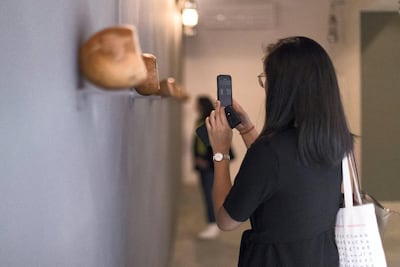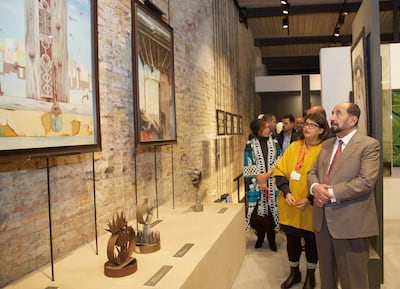In April, I read something that caught my eye on Twitter. It was a series of announcements made by Sheikh Mohammed bin Rashid, Vice President and Ruler of Dubai, to double the GDP contribution of creative industries to five per cent of Dubai’s economy by 2025.
Sheikh Mohammed said: “The UAE is a global economic capital and creativity is part of our economy and of our quality of life, and a major engine for the future of our country”.
This included a plan to make a creative zone in Dubai’s industrial district of Al Quoz that would transform the Emirate, making it an artistic and cultural city.
In parallel, a month earlier, the conferment of the ten-year Golden Visa for distinguished cultural professionals and those in creative fields was established, another excellent move that will attract creatives from a number of fields to the UAE, a place from which they can set up businesses and realise their ambitions.
Besides Dubai, other Emirates also support the work and requirements of people in cultural industries, with the common goal of encouraging art and culture in the UAE, and to protect and provide incentives to people in creative fields.
These industries comprise, but are not limited to, publishing, writing, audio and film, and also pertain to the fields of software, fashion, gaming, design and architecture.
When looking out for creatives, one area that is worth further examination is copyright law and its legal framework. In my professional capacity, I have come across numerous incidents over the years where copyright infringement issues have arisen.
From cases such as a photographs being used without the permission of the photographer, to disputes over fees to reproduce a segment of, say, a documentary film, especially if the author behind the work cannot be traced. There have been a number of such cases.

It is frustrating to hear the stories from artist friends asking my advice when they find themselves victims of copyright violations, instances where their art work has been used in advertisements or printed on products without their knowledge or permission.
I recall a recent example of a young jewellery designer’s beautiful and unique work copied from her website by another person, who had then manufactured very similar pieces and passed them on as their own designs.
This makes the creator of the original work feel helpless, unsure of what to do and from whom to seek help. This is where tightening existing laws comes into play.
So, what exactly is copyright and why is it important to artists, and by extension, to the very cultural fabric of a society?
Copyright describes the legal rights of the owner of intellectual property (IP), giving them exclusive rights to share or make copies of their creative work. It is to protect the artist’s expression of an idea, but not the idea itself.
Copyright applies to a broad range of expressions, from literary work, software, art, paintings, music, dramatic pieces and audio-visual expressions that include, but are not limited to, photography, film and so on. It is essential to sustain the morale of artists and ensure they have rights – although with limitations and exceptions – for how their work is reproduced, shared, copied or published. This is to prevent the exploitation of artists and to give value to their work. Robust copyright laws help develop and protect cultural industries by encouraging innovation. So, having these laws in place perpetuates a culture where freedom of creative expression is respected.
In today’s age of non-fungible tokens or NFTs, the digital revolution has made the issue of copyright implementation especially urgent. With easy accessibility and frequent cases of copying or sharing without consent, it is imperative for copyright laws to be properly defined.
The UAE has strong copyright laws. As a signatory to the Berne Convention for the Protection of Literary and Artistic Works, the UAE has adopted measures similar to those in a number of jurisdictions, such as Egypt, the UK and France, to form the basis for a number of its own laws.

However, infringement still occurs across the region for two main reasons.
The first, which can be difficult to tackle, is that regulations differ from country to country and, therefore, the matter of which laws apply in which jurisdictions often comes up. Secondly, some of the existing laws can be obsolete.
Fortunately, we can do something about this. We can update the current UAE copyright laws and enforce them as a way to protect creatives. This would then give them a sense of relief, as artists and creatives are assured that a clear legal recourse is available, if and when the need arises.
Despite the many legal protections already in place, the UAE will benefit by keeping up with the new direction and vision of the world’s creative industries. As Sultan Sooud Al Qassemi, founder of the Barjeel Art Foundation and an academic, said: “In order for the UAE to keep attracting creative talents from the region and beyond, we have to continuously update our IP and copyright laws and regulations, especially in a fast-changing environment.”
In recent years, the EU and US have made improvements to offer further legal protection to artists, especially to those whose medium is the relatively new space of digital art. In keeping with the global trend to safeguard creativity, it would be in the UAE’s interest to revise existing laws and modify them where necessary.
Moreover, disseminating information to artists and creatives about their rights empowers them to seek appropriate action. In instances where their work or ideas have been used without permission, an author would be shielded from infringement. The message would be clear: creative work cannot be arbitrarily transferred without the permission of its creator.
There are other facets to the law that empower creative professionals. For example, the law gives authors or creators the right to protect their anonymity, if he or she so wishes. Anyone who then exposes their identity can be prosecuted.
Creatives also have the legal right to be remunerated for when their work is reproduced. The federal law on copyright in the Emirates already goes a long way to defend the moral and economic rights of a creative, be it a writer, a musician or a designer. Any creative is given automatic protection, though registration with the UAE Ministry of Economy is recommended to reinforce the authenticity of their work.
The Emirates has already gained global recognition for its flourishing arts ecosystem, whether it is for the UAE pavilion in the Venice Biennale, the Sharjah Biennial, all the museums in the UAE – there are more than 50 – the art fairs of Dubai and Abu Dhabi, the various festivals, or the public installations and commercial galleries that prosper in almost every emirate of the country.
Given these world-class institutions and cultural spaces, a stronger and more strongly executed copyright law will certainly add to the glow of the UAE’s art world.


